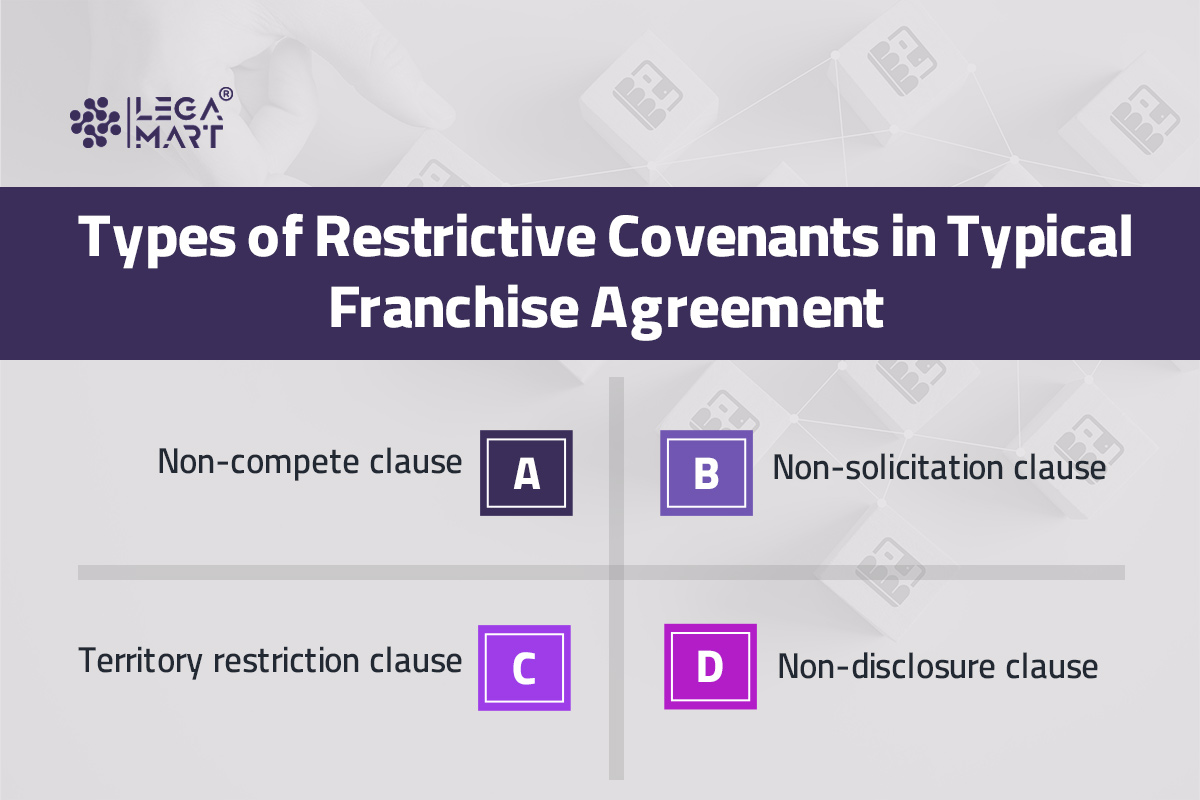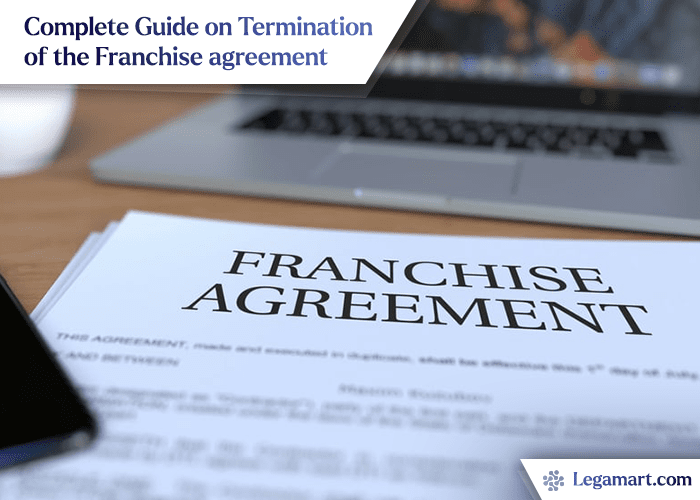Introduction
Franchise Agreements are legally binding agreements. For example, X Ltd. is very famous for its pizza. They will provide their name and recipe to different outlets to grow their businesses by local advertising and operate in other areas, countries, or worldwide. This arrangement requires the franchisor and franchisee to sign a franchise agreement that secures their rights and liabilities. Following the signing of a franchise agreement by this common brand, it is essential to determine how to handle the termination of the franchise agreement following the expiration of the franchise agreement or if either party violates it.
A franchise agreement is a contract between the franchisor and the franchise. However, either party can deny compliance with the terms of the agreement, resulting in the termination of the contract and franchise relationship.
This blog will discuss in detail those conditions in which either party can terminate the agreement. There are inevitable consequences of such termination, such as giving back the rights over intellectual property in more detail.
Find the right lawyer for Commercial and Business Law
What is a Franchise Agreement?
It is an agreement between two parties, a franchisor and a franchisee. They contract with a franchisee to give them the right to operate the business and sell and distribute the goods and services in the market.
The franchisee gives consideration to the franchisor, making it a legally binding contract. The process involves a variety of arrangements, such as fees, royalties, rents, etc. Both parties must adhere to several clauses related to the agreement’s amounts, terms, obligations, and conditions.
The agreement encompasses critical elements pertaining to operational procedures, intellectual property sharing, and the duration of the franchise including:

- The location where the new business would operate.
- Selection of a suitable place for operating the business.
- Royalties or fees amount to be paid to the franchisor.
- The validity period of the agreement.
- Payment for obtaining the franchisor’s trademarks.
- Tax obligation and insurance of the franchise agreement.
- Details about the training support to be given by the franchisor to the franchisee.
- Mode of operation details like standards of the goods or services, quality control, insurance coverage, royalty payment, advertising commitment, etc.
- Details about using the logo or trademark.
- Details about the terms and payments for advertisements.
- The policy of cancellation and termination of the agreement, and
- Strategies to be used to exit.
How to Get out of a Franchise Agreement?
The termination clause is included under the majority of franchise agreements. You can use it to get out of a franchise agreement. The termination clause generally states why the agreement can be suspended or terminated by either of the parties. For example, if the other party fails to comply with contractual clauses and other obligations, the contract is terminated.
A further provision can specify that the agreement will terminate if the other party does not resolve the material breach within a reasonable period.
When Should a Franchise Agreement be Terminated Early?
There is a fixed period of the validity of the agreement. For example, the agreement between X Ltd. and Mr. A will be valid for five years. The agreement will end automatically after five years. After the termination of business, it will cease to exist, or the parties will renew the contract to continue the franchise agreement works. However, both parties can terminate the agreement and leave the arrangement before the validity period expires. If the franchisor’s standards suggest terminating the agreement after two years due to some legal issues, the franchisor may do so.
There can be different reasons for the franchise agreement to end early, such as the franchisee is no longer equipped enough to carry out the business or the franchisor thinks that the franchisee’s conditions and standards are not being fulfilled.
When the franchisor wants to terminate
In the dynamic world of business, there may come a time when a franchisor decides to terminate a franchise agreement. When this occurs, it’s essential to understand the legal framework in place, specifically the franchising code of conduct, which governs franchising relationships in many countries.
Franchisors can initiate the termination of a franchise agreement under specific circumstances permitted by the Franchising Code of Conduct. These include:
- Breach of Agreement: One of the most common reasons for franchisor-initiated terminations is a material breach of the franchise agreement by the franchisee. Most franchisors breach agreements to escape non-payment of fees, violation of operational standards, or any other substantial failure to adhere to the terms of the agreement.
- Insolvency: If a franchisee becomes insolvent, goes into liquidation, or enters voluntary administration, the franchisor may choose to terminate the agreement. This is often seen as a necessary step to protect the brand and the interests of both parties.
- Abandonment: In some cases, franchisees may abandon their businesses without notice. In such instances, franchisors may have grounds to terminate franchisor licenses under the code.
- Non-Renewal: When a franchise disclosure document reaches its expiry date and, on the franchisor’s approval, it is decided not to renew, this is a form of termination.
- Force Majeure: Unforeseen circumstances, such as natural disasters or government regulations, may make it impossible for a franchisee to continue operations. In such cases, the franchisor may need to terminate the agreement.
The Franchising code of conduct outlines clear procedures that franchisors must follow when terminating a franchise agreement:
- Cooling-off Period: After receiving notice, the franchisee may have a “cooling-off” period during which they can rectify any issues that led to the termination notice. This period is usually set by the code or specified in the franchise agreement.
- Mediation: If disputes arise during the termination process, both parties may be required to engage in mediation or dispute resolution procedures as outlined in the legal terms.
- Compliance with Lease Arrangements: If the franchisee operates from a leased premises, the franchisor must also consider the lease terms and obligations. Termination of the franchise agreement may necessitate addressing lease-related matters separately.
- Final Settlement: Once the termination is finalized, the franchisor and franchisee should agree on the terms of the settlement, not on the franchisor’s terms, including the return of any assets or intellectual property.
- Notice: Franchisors must typically provide written notice of their intention to terminate, stating the reasons for termination. The length of the notice period may vary depending on the circumstances and the terms of the agreement.
When a franchisee wants to terminate?
Under a franchise system, there are situations where a typical franchise agreement may seek to terminate the agreement. In this article, we’ll explore the grounds for termination when a franchisee wishes to part ways with their franchisor.
- Expiration of the Franchise Agreement – One of the most common grounds for franchise termination is the expiration of the franchise agreement. These agreements typically have a set duration, after which the franchisee can choose not to renew the contract. This allows both parties to reassess their options and decide whether they want to continue the business relationship.
- Breach of Contract – When either party fails to uphold their obligations outlined in the franchise agreement, it can lead to termination. Common breaches by franchisees include failure to pay royalty payments, violating the franchisor’s operational standards, or altering the brand’s image, products, or service marks without permission. On the other hand, franchisors can breach the contract by failing to provide the promised support or not maintaining the integrity of their brand.
- Financial Insolvency – If a franchisee’s business faces financial difficulties that prevent them from operating the business effectively in their trade names or meeting their financial obligations, this can be grounds for termination of franchises. The franchisor may terminate the legal agreement when the franchisee consistently fails to pay royalty fees, rent, or other fees, or when the franchisee files for bankruptcy of franchised business.
- Final Settlement: Once the termination is finalized, the franchisor and franchisee should agree on the terms of the settlement, including the return of any assets or intellectual property.
- Inadequate Performance –The franchise agreement outlines performance standards that franchisees are expected to meet. If a franchisee consistently underperforms and fails to meet these standards, the franchisor may have the right to terminate the agreement. Performance issues could include low sales, poor customer service, or failure to maintain the required standards of cleanliness and professionalism.
- Violation of Non-Compete Clauses –Franchise agreements usually contain non-compete clauses that prevent franchisees from operating similar businesses or working in related industries during and after the agreement’s term. Violating these clauses can result in the termination of the franchise agreement.
- Transfer of Ownership Without Approval –Franchise agreements typically require franchisor approval for the transfer of ownership or the sale of the franchise. If a franchisee attempts to transfer ownership without obtaining the necessary consent, it can lead to termination.
- Mutual Understanding – In some cases, the franchisee and franchisor may agree to terminate the agreement amicably. This can occur for various reasons, including changes in business strategies, market conditions, or personal circumstances.
- Dispute Resolution and Litigation – When conflicts or disputes arise between the prospective franchisee and franchisor and cannot be resolved through negotiation or mediation, the franchise agreement may be terminated as a last resort. Litigation can be lengthy and costly, but it may be pursued if all other options fail.
When a franchisee wishes to terminate their franchising agreement, they must adhere to the specific procedures outlined in this code. Here’s a step-by-step guide to the operations manual:
- Review Your Franchise Agreement: The first step for any franchisee considering termination is to carefully review their franchise agreement grants. Pay close attention to the termination clauses, which will outline the specific conditions and requirements for ending the agreement. These clauses may cover notice periods, reasons for termination, and any associated costs or penalties.
- Consult Legal Counsel: Before proceeding, it’s advisable to consult with legal counsel who specializes in franchising law. They can help you understand the legal implications of termination and ensure you follow the proper procedures.
- Provide Written Notice: In most cases, the Franchising Code requires franchisees to provide written notice of their intention to terminate the agreement to the franchisor. This notice should include the reasons for termination and the proposed termination date. The notice period and specific requirements may vary depending on the terms of your franchise agreement and the circumstances surrounding the termination.
- Engage in Good Faith Negotiations: The Franchising Code emphasizes the importance of good faith negotiations between franchisors and franchisees. Both parties should engage in meaningful discussions to resolve any outstanding issues, including the return of assets, payment of outstanding fees, and the transition of the business.
- Consider Mediation: If disputes arise during termination, either party can request mediation through the Australian Small Business and Family Enterprise Ombudsman (ASBFEO) or an approved mediator. Mediation can help resolve disagreements and facilitate a smoother termination process.
- Finalize Transition and Documentation: Once an agreement is reached, ensure that all necessary documentation is in order. This may include the transfer of leases, licenses, and other assets and the settlement of any financial obligations.
- Comply with Post-Termination Obligations: After the termination is complete, franchisees should comply with any post-termination obligations outlined in the franchise agreement. This may include non-compete clauses, confidentiality agreements, and other contractual obligations.
- Seek Legal Advice on Dispute Resolution: If disputes persist after termination or if you believe that the franchisor has not acted in accordance with the Franchising Code, it is advisable to seek legal advice on dispute resolution options at the franchised location, which may include legal action through the courts.
Restrictive covenants in Franchise Agreements
Among the various clauses and provisions in these agreements, restrictive covenants hold a significant place. In this article, we will delve into the business model of restrictive covenants in franchise agreements, their purposes, types, and Negotiating Restrictive Covenants.
The Purpose of Restrictive Covenants in Franchise System
Restrictive covenants are primarily designed to protect the interests and intellectual property of the franchisor. They ensure franchisees do not misuse the franchisor’s brand, trade secrets, or proprietary information. Additionally, these covenants are intended to maintain uniformity and consistency across the franchise network, which is crucial for the overall success and reputation of the brand.
Types of Restrictive Covenants in Typical Franchise Agreement

Non-compete clauseOne of the most common restrictive covenants is the non-compete clause. This clause prohibits franchisees from engaging in a competing business either during the term of the franchise agreement or for a specified period after its termination. The rationale behind this restriction is to prevent franchisees from using their knowledge of the franchisor’s operations to compete directly with the franchise system.
Non-solicitation clause
The non-solicitation clause prevents franchisees from poaching or soliciting the franchisor’s employees, customers, or suppliers. This helps maintain the stability of the franchise system by preventing disruptions caused by franchisees trying to recruit key personnel or steal customers.
Non-disclosure clause
Non-disclosure clauses, or confidentiality clauses, require franchisees to keep all proprietary information, trade secrets, and operational details of the franchise system confidential. This ensures that sensitive information doesn’t fall into the wrong hands and maintains the integrity of the brand.
Territory restriction clause
In some franchise agreements, franchisors grant franchisees exclusive territories to operate. The assigned territory restriction clause prevents franchisees from expanding their operations outside their designated area, thereby preventing intra-network competition.
Implications for Franchisees
While restrictive covenants serve legitimate purposes for franchisors, they can have significant implications for franchisees:
Limited freedom
Franchisees may find their freedom in the operating system of their businesses as they see fit curtailed by restrictive covenants. These restrictions can affect their ability to innovate or adapt to local market conditions.
Post-termination restrictions
After the franchise agreement ends, franchisees may be bound by non-compete and non-solicitation clauses, limiting their ability to enter similar businesses or reach their established customer base.
Legal consequences
Violating restrictive covenants can lead to legal actions, including injunctions, damages, or even the termination of the franchise agreement. Franchisees should be aware of the potential consequences of breaching these covenants.
Negotiating Restrictive Covenants
It’s important for prospective franchised outlets to carefully review and negotiate the terms of restrictive covenants before signing a franchise agreement. Franchisees should consider the duration and scope of these covenants, ensuring they are reasonable and necessary to protect the franchisor’s legitimate interests. Seeking legal and technical support of the counsel is advisable to ensure that the covenants are fair and enforceable under applicable laws.
What Can Cause the Early Termination of the Franchise Agreement?
Franchisees receive the right to operate a business from the franchisor, who owns the business. Thus, they have a lot of say and power while making the terms and conditions of the agreement. The franchisor can terminate the franchise early for a variety of reasons, including:
- The franchisee has been convicted of a crime.
- Bankruptcy due to which the business cannot continue or conduct business.
- The franchisee lost the license required to do a specific type of business. For example, a liquor license is required to sell liquor.
- The franchisee failed to pay the amount as agreed in the agreement.
- The work of the franchisee is causing danger to public health and safety.
- It can also be mutually terminated without a specific reason.
When Can a Franchisee Terminate a Franchise Agreement?
Generally, the franchisee doesn’t terminate the agreement as he is willing to operate the business with the branch name of the franchisor. Although there are some reasons for which a franchisee can terminate the agreement early, such as:
- The franchisor agreed to provide required skills training to the franchisee but failed to do so. Training is necessary to make and sell a specific recipe when the brand is known for its quality and uniqueness.
- The franchisor has committed fraud or misrepresentation, so the franchisee can terminate the agreement.
What Happens When a Franchise Agreement Expires?
The franchisee has to pay the outstanding amount to owe to the franchisor. The franchisee loses the right to use the franchisor’s intellectual property; thus, they can no longer use the franchisor’s trademark. The logo cannot be operated anymore by the franchisee. It must be removed from all the advertisements and brochures when the franchisor terminates the agreement.
If the location appears like the franchisor brand, it has to be changed to prevent misuse of identity. Changing the uniform of franchisee employees is necessary since it can confuse the general public.
It is even necessary to change the recipe for the food provided by the franchisor. For example, the pizza of company X Ltd. has a secret recipe that the franchisee cannot use after the termination of the franchise agreement.
If the franchisee has taken any equipment or property from the franchisor to carry out business, they must return it to the franchisor.
If there was any non-disclosure agreement between the franchisor and franchisee or confidentiality clause in the franchise agreement, the franchisee should never reveal the trade secrets in the market.
When the termination has happened as a legal consequence and parties are contending that they don’t owe any debt to the other party, that party’s legal representative has to prove the same in court.
The franchisee must keep and respect the non-compete clause after termination. In other words, the franchisee cannot run a competing business with the franchisor. There are specific duties that a franchisee has after the termination of the contract, such as acting in good faith.
Conclusion
The franchise agreement helps the franchisor and franchisee to define the mode of operation that would take place between them after the agreement is signed. A contract restricts the parties’ conduct prior to, during, and after the termination of the contract and imposes penalties on any party who violates it. Thus, the parties involved must take legal advice from a skilled and expert attorney to make a good franchise agreement.
You might want to read our article on how to trademark a logo in the USA?




